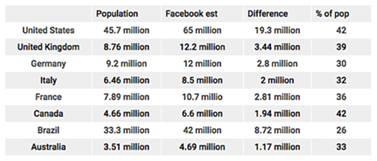They’re coming in faster than the Corona statistics. I’m talking about the doom and gloom reports about Facebook. It seems readers and listeners are just as uninterested in those reports as in the Covid statistics. And what is worse, no one who remembers them, the day after they are published. You don’t remember yesterday’s infection rate either, do you?
You can get away with forgetting the exact infection rates these days. At least, you know the range, the order of magnitude. What is left is food for number fetishists or auditors…
But that you as an advertiser, would no longer follow the developments in the Facebook saga, that’s a lot worse! Yes, there was something about Cambridge Analytica and a data breach, we all remember that. But the number one question, which has fallen to the wayside in this discussion, was whether Facebook had actually cooperated in the manipulation of millions of pieces of data. In the end, they managed to dodge the bullet.
Last week, however, new elements emerged from a legal case involving Facebook. Leaks of all kinds aside, the issue now is the reliability of data. That data, dear advertiser, is the basis for determining the rates and the order of magnitude of your investment in this social medium. If you ask us, we consider this information to be very alarming. Here are the main extracts from a long list:
Sheryl Sandberg, COO of Facebook and Zuckerberg’s lieutenant, appears to have been fully aware of the overestimates of the reach figures.
More to the point, Sandberg acknowledged in an internal email that she had known about these mistakes for years.
Facebook staff had raised flags internally that the data used in their tools gives a fraudulent representation to advertisers.
Management appears to have refused to accede to those employees’ request to remove the blatant lies from the data solely because publishing the correct reach data would have a “significant impact” on the company’s earnings.
Putting profit motives above ethics, dollars and euros outweighing honesty and transparency, shielding of source data to safeguard bonuses… The dotcom bubble is back!
However, dear advertiser, you only have to open your eyes a bit to detect the misinformation. Facebook claimed to reach 41 million American young people between the ages of 18 and 24 when there are only 31 million young Americans. But there were more issues. Just look at this list comparing real population numbers for the target audience of “twenty-somethings” versus the numbers Facebook claims to reach:

This will be no different for the Benelux, you can rest assured! And the embarrassing thing is that Facebook has never allowed a full, independent audit of its audience numbers!
It is up to you to allocate budgets, dear advertiser, along with the partners around you. But as the saying goes, once bitten, thrice shy!
